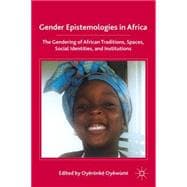
What is included with this book?
Oyeronke Oyewumi is Associate Professor of Sociology at SUNY Stony Brook. She was born in Nigeria and educated at the University of Ibadan and the University of California at Berkeley, Oyewumi has been widely recognized for her work. The monograph Invention won the 1998 Distinguished Book Award of the American Sociological Association and was a finalist for the Herskovitts Prize of the African Studies Association in the same year. She has garnered a number of research fellowships, including Rockefeller Fellowships, a Presidential fellowship, and a Ford Foundation grant. Oyewumi's most recent research support was a Rockefeller Humanities Fellowship on Human Security (2003/2004), managed by National Council for Research on Women. (NCRW).
Introduction. Genderings -- Oyeronke Oyewumi* Decolonizing the Intellectual and the Quotidian: Yoruba Scholars (hip) and Male Dominance -- Oyeronke Oyewumi * Gender in Translation: Efunsetan Aniwura.-- Adeleke Adeeko?* Ode to Patriarchy: The Fine Line Between Praise and Criticism in a Popular Senegalese Poem -- Marame Gueye * Women and Leadership in Nigerian Islam: The Experience of Alhaja Sheidat Mujidat Adeoye of Osogbo -- David O. Ogungbile * Engendering Critical Spatial Literacy: Migrant Asante women and the Politics of Urban Space -- Epifania Amoo-Adare * Outsiders Within: Experiences of Kenyan Women in Higher Education -- Njoki M. Kamau, * Self-image and Self-naming: A Social Analysis of Women’s Microenterprises in Senegal and Mali -- Marieme S. Lo * Irua Ria Atumia and Anti-colonial struggles among the Gikuyu of Kenya: A Counternarrative on “Female Genital Mutilation” -- Wairimu Ngaruiya Njambi * NAKABUMBA: God Creates Humanity as a Potter Creates a Pot -- Christine Saidi * Beyond Gendercentric Models: Restoring Motherhood to Yoruba Discourses of Art and Aesthetics -- Oyeronke Oyewumi
The New copy of this book will include any supplemental materials advertised. Please check the title of the book to determine if it should include any access cards, study guides, lab manuals, CDs, etc.
The Used, Rental and eBook copies of this book are not guaranteed to include any supplemental materials. Typically, only the book itself is included. This is true even if the title states it includes any access cards, study guides, lab manuals, CDs, etc.